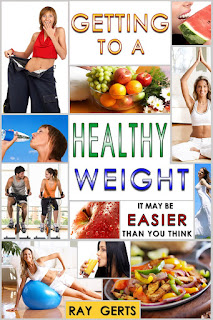This post by this author is trying to do the same thing that I'm doing every day. The average American does know or doesn't care what they are doing to their health when my keep adding body fat. Americans think that because they're older they will automatically lose their health and that's not true. You will lose your health by neglecting your body. Read the post below and pay heed. Don't become another statistic.
By Randy Dotinga
HealthDay Reporter
WEDNESDAY, Aug. 3, 2016 (HealthDay News) -- There's no doubt about it: Americans are getting heavier and heavier. But new U.S. estimates may still come as a shock -- since the late 1980s and early 1990s, the average American has put on 15 or more additional pounds without getting any taller.
Even 11-year-old kids aren't immune from this weight plague, the study found. Girls are more than seven pounds heavier even though their height is the same. Boys gained an inch in height but also packed on an additional 13.5 pounds compared to two decades ago.
When looked at by race, blacks gained the most on average. Black women added 22 pounds despite staying the same average height. Black men grew about one-fifth of an inch, but added 18 pounds, the study found.
"We are not doing nearly enough to control and reverse the obesity epidemic and doing far too much to propagate it. This is another notice of that sad fact," said Dr. David Katz. He directs the Yale University Prevention Research Center and is president of the American College of Lifestyle Medicine.
The new statistics were released Aug. 3 in a report from the U.S. Centers for Disease Control and Prevention's National Center for Health Statistics. The statistics for 2011-2014 are based on an analysis of a sample of 19,151 people who underwent medical examinations and were interviewed at home.
According to the report, the average weight of men in the United States rose from 181 pounds to 196 pounds between 1988-1994 and 2011-2014. Their average height remained the same at about 5 feet, 9 inches.
The average woman, meanwhile, expanded from 152 pounds to 169 pounds while her height remained steady at just under 5 feet, 4 inches.
How big of a deal are these weight gains?
"A 15- to 16-pound weight gain is fairly significant and typically would be consistent with a couple of points increase in body mass index," said Anthony Comuzzie. He's an obesity researcher at the Texas Biomedical Research Institute in San Antonio.
Body mass index, or BMI, is a rough estimate of a person's body fat using height and weight measurements. The BMI classifies people into several categories, such as normal, overweight and obese.
"From a practical point," Comuzzie said, the average weight gain "means that someone who was on the high end of normal weight would have likely moved into the overweight category, and those at the high end of the overweight category would have likely moved into the obese category."
This matters because "we know that increasing BMI is a good indicator of overall risk for a variety of diseases, including heart disease and diabetes," he said.
The reasons behind the increase in weight are complex, according to Comuzzie. In part, he suggested, it's related to trends toward less exercise and more access to food that's rich in calories.
Could the U.S. population be getting fatter because it's getting older overall, and developing lower metabolisms?
Both Comuzzie and Katz discounted this explanation since the new report matches age groups for the two time periods.
Comuzzie said the findings reveal that the U.S. population is still gaining weight at "a fairly rapid rate, and such an increase does not bode well for the overall health of the nation. The findings suggest there will likely be an associated increase in chronic diseases like type 2 diabetes and heart disease in the coming years," he noted.
As for next steps, Katz said there's much to be done. Whether that will happen is another matter.
"There are many active efforts to combat obesity, but our culture at large is in the business of propagating it for profit, from big food to big media to big pharma. It's that simple. We do much more, across the expanse of our culture, to foster obesity than to defend against it," Katz said.

I agree totally with the researchers, but because our economy depends on making money, and Congress will listen to the Lobbyists first, we will continue to be served this "frankenfood" that fills the shelves in our food stores.
If you really want to lose your body fat than look for my e-books at the websites listed below. You'll get information on Healthy eating, exercise, and diet. Instead of spending hours on the internet reading dozens of posts, you can save time by picking up one of my e-books.
There are two e-books. “How Bad Do You Want To Lose Weight?” is available at all the online bookstores selling for $1.99. Go to any of the websites below and search the title to find my e-book. This book gives you all you need to lose weight without spending money on gym memberships, diet plans or meal plans. Look for my book. at Amazon.com, B&N.com, iBooks, Kobo.com, Scribd.com, or Gardner Books in the U.K.
My new e-book is available on Smashwords.com, just type “getting to a Healthy Weight” in the search box at the top of the home page.






